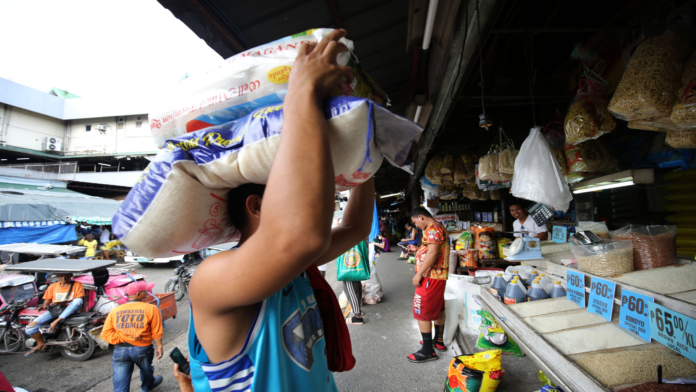The Department of the Interior and Local Government (DILG) together with Metro Manila mayors and administrators of public and private markets will assist the Departments of Trade and Industry (DTI) and Agriculture (DA) to ensure the enforcement of the rice price cap as directed by President Ferdinand R. Marcos Jr.
Marcos issued Executive Order No. 39 on Aug. 31, mandating price ceilings for regular milled rice at PHP41 per kilogram and well-milled rice at PHP45 per kilogram nationwide starting Sept. 5.
“Dahil sa kalokohan ng iilang mga tao na hino-hoard at mina-manipulate ang presyo ng bigas, galit na galit ang ating Presidente kaya ipapatupad ngayon ang mandated price ceilings sa bigas (Because of some people hoarding and manipulating rice prices, our President is mad and that’s why this mandated price ceiling for rice will be implemented now),” DILG Secretary Benhur Abalos said in a news release on Sunday.
During a meeting presided over by Abalos and Metropolitan Manila Development Authority (MMDA) Acting Chair Don Artes on Saturday, Metro Manila local government units’ (LGU) chief executives committed to support the implementation of EO 39 through their local price coordinating councils and by helping in the widest dissemination of EO 39.
Mayors Jeannie Sandoval of Malabon City, John Reynald Tiangco of Navotas City, Ike Ponce of Pateros and Wes Gatchalian of Valenzuela City were among those who attended the meeting.
Abalos said he is counting on the help of market masters who will play key roles in the effective implementation of the Presidential directive on rice prices cap.
“Susi ang market masters dito. Magtulungan tayong lahat para siguruhing sinusunod ang price ceilings sa bigas, kasama ang pulis at ang MMDA. Ang importante ay magkaroon ng tuloy-tuloy na supply ng bigas sa tamang presyo (Market masters’ help are crucial. Let us help each other to make sure the rice price ceilings are followed, together with police and the Metro Manila Development Authority. What’s important is that supplies are continuous and the right prices are imposed),” he said.
Abalos also directed the Philippine National Police to extend assistance in the enforcement of EO 39.
Earlier, the DA and DTI said despite stable and sufficient rice supply, there are reports of illegal price manipulation through hoarding by traders and collusion among industry cartels.
Food security soldiers
AGRI Party-list Rep. Wilbert Lee said affordable and stable rice prices are possible if the government will invest in food security.
“Food security is a national security issue. Kung ganito ang perspektibo natin (If our perspective is like this), we should treat our farmers as food security soldiers — an army being mobilized to feed millions of Filipino families, an army waging a war on hunger,” Lee said in a news release on Sunday.
Lee has filed House Bill (HB) No. 9020 or the “Cheaper Rice Act” which aims to establish a program that will provide subsidies intended to lower rice prices while encouraging farmers to produce more rice.
Lee said lowering rice prices to PHP20 pesos a kilo is possible in the long term “if we are willing to invest in this army and are willing to implement a plan to increase local rice supplies and shield our kababayan (countrymen) from rising international rice prices.”
He said if it is a national issue, automatically, it becomes an expense item that should be funded by the government every year. He said there must be a concrete plan on how to address this problem.
HB 9020 seeks to establish a Rice Incentivization, Self-Sufficiency, and Enterprise (RISE) Program to ensure that rice prices remain affordable for the ordinary Filipino consumer via a subsidy that will be provided for the estimated 2.6 million rice farmers.
The government shall provide adequate funds to buy the palay (unhusked rice) produced by the farmers at a higher price to ensure they earn enough profit from their harvests.
After that, the government shall sell the products at a cheaper price, Lee said.
The RISE Program Act tasks the DA, in coordination with the DTI and other relevant government agencies, to develop a pricing structure that will cover the minimum guaranteed prices for palay.
The program shall also establish a regular monitoring system to mitigate the impact of fluctuating prices on palay and rice and design a system for payouts to farmers based on various scenarios of price decline. (PNA)


